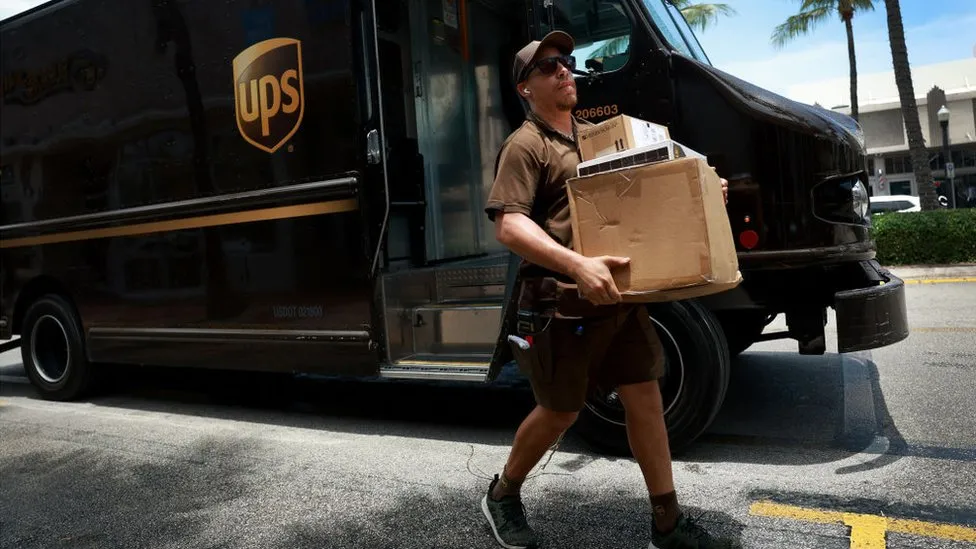Risk of major disruption as UPS strike looms in US
Talks between delivery giant UPS and its workers in the US have broken down, raising the possibility of the first strike from staffers at the firm in more than 25 years.
The two sides have been negotiating for months over demands such as higher pay and better work conditions.
Workers say they are due a better contract, especially after the surge in work during the pandemic.
A walkout at UPS could lead to significant disruption to the economy.
The company delivers more than 24 million packages a day in more than 220 countries around the world.
In the US, it estimates that the value of the goods it handles are worth about 6% of the US economy, including time-sensitive shipments for health care firms and others.
"This multibillion-dollar corporation has plenty to give American workers — they just don't want to," said union leader Sean O'Brien, president of the Teamsters, which represents about 340,000 full and part-time workers at UPS in the US. "UPS had a choice to make, and they have clearly chosen to go down the wrong road."
UPS said it was proud of its offer, which it said built on its "industry leading pay". With nearly a month left to negotiate, it said the union had "a responsibility to remain at the table".
"Refusing to negotiate, especially when the finish line is in sight, creates significant unease among employees and customers and threatens to disrupt the US economy," the statement said.
UPS has the biggest unionised workforce of any company in the US.
The two sides had appeared to be making progress as recently as last week, reaching agreements on a range of issues including installing air conditioning in vans and eliminating a two-tier pay system for part-timers. But pay rises remain a sticking point.
Teamsters said talks concluded at 4am in the US on 5 July without an agreement and no further negotiations were scheduled. UPS workers voted overwhelmingly last month to authorise a strike if the two sides failed to reach a deal by 31 July, when the current contract expires.
A walkout would be risky for both sides, with parcel volumes waning as the economy slows and the pandemic boom fades, leaving competitors with the capacity to absorb some of the business, said Satish Jindel, president of ShipMatrix Inc, which advises companies on shipping arrangements.
He said some of the businesses he works with are already diverting shipments and many others are eyeing other plans.
"If they are trying to play the game of who is going to go off the cliff, you know what - they both will go off the cliff," Mr Jindel said of UPS and the union. "There will be no winner."
The last time UPS faced a strike was in 1997, when the 15-day stoppage cost UPS hundreds of millions of dollars.
The stand-off comes at a time when labour tensions have been running high in the US - especially in the delivery sector.
The US Labor Secretary stepped in last month to strike a deal between ports and dockworkers on the West Coast, which had led to major slowdowns and stoppages. In December, Congress was forced to intervene to ward off a strike by freight rail workers in the US.
Antonio Rosario, who started working for UPS in New York in 1994, said he was ready for a walkout, especially after the gruelling conditions workers experienced during the pandemic as the company's profits boomed.
"The workload was insane. It was like a never-ending peak - I've never seen that amount of packages coming through our system before," he said. He added: "We're not asking for anything that's crazy. They can afford this."
Mr Rosario had been in college, hoping to be an actor, when he went to work at UPS. The job, which he took to help support his family after his father died, helped keep his family in their home. But, he said, workers today - especially part-timers like he was when he started - can no longer find that same stability. It is one reason he has been organising fellow workers for a strike.
"I believe in this movement so much because there's a lot of kids like myself," he said. "Finding a union job for somebody like that, who wasn't able to go to school, wasn't able to go to college and can get a good union job and can make a living, is a big deal and these corporations are trying to take that away from people and that shouldn't be the way it goes."
"I'd like to strike just to teach them a lesson," he added. "I feel like they need to feel that - how quickly we can take our labour away."





Post a Comment